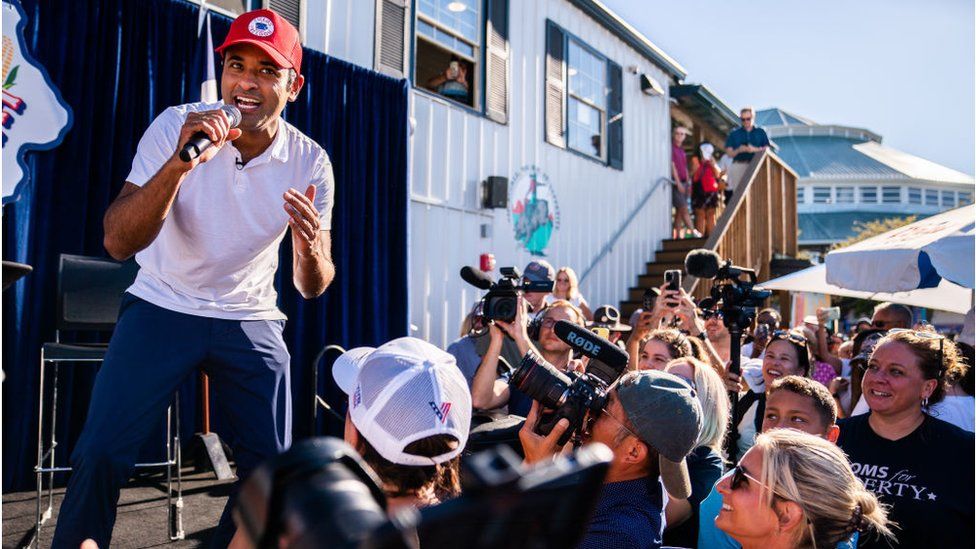5 hours ago
About sharing
Rap star Eminem has asked aspiring Republican presidential candidate Vivek Ramaswamy to stop using his songs.
The letter comes more than a week after the biotech entrepreneur delivered an impromptu performance of Lose Yourself at the Iowa State Fair.
Eminem made the request via performing rights organisation BMI in a letter dated 23 August.
Mr Ramaswamy is vying to unseat Donald Trump as the presumed 2024 Republican nominee.
A spokeswoman for Mr Ramaswamy said he will comply with the request by Eminem, whose real name is Marshall Mathers III.
The letter says the company “received a communication from” Eminem objecting to the Republican’s use of his “musical compositions”.
“BMI will consider any performance of the Eminem works by the Vivek 2024 campaign from this date forward to be a material breach” of its licence, it adds.
Ramaswamy: ‘I was clearly the winner of this thing’
Referring to an Eminem lyric, campaign spokeswoman Tricia McLaughlin said in a statement to US media: “Vivek just got on the stage and cut loose.”
“To the American people’s chagrin, we will have to leave the rapping to the real slim shady.”
Mr Ramaswamy posted on X, formerly known as Twitter, to make light of the situation.
“Will The REAL Slim Shady Please Stand Up? He didn’t just say what I think he did, did he?” he wrote, referring to more of Eminem’s lyrics.
Politicians and musicians have clashed over the use of music for decades.
Bruce Springsteen castigated President Reagan for planning to use Born in the USA for his 1984 election campaign. Fatboy Slim furiously denounced Labour’s use of Right Here, Right Now at their 2004 conference, the year after the Iraq War. And the Rolling Stones fought a long battle to prevent Donald Trump using You Can’t Always Get What You Want as his walk-off music.
Legally, however, US politicians don’t always need direct permission from artists. Their campaigns can buy licensing packages from music rights organisations like BMI and ASCAP, which gives them legal access to more than 20 million songs for political rallies.
However, artists have the right to remove their music from that list. The Rolling Stones have done so, and Eminem has followed suit after objecting to Mr Ramaswamy’s apparently impromptu rendition of Lose Yourself.
It seems that the rapper didn’t know his music was covered by the blanket licence until then – an apparent problem with the US model, which resulted in artists like Adele, Neil Young, Phil Collins and the estates of Tom Petty and Prince objecting to Mr Trump’s use of their music in 2016 and 2020 after the fact.
In the UK, the situation is clearer. PPL – the body that licences the use of recorded music – requires political events like party conferences to “obtain permission from the relevant rights holder” before using a song.
The 38-year-old political newcomer is seen as a rising star in the campaign following a strong performance at last week’s Republican debate.
He has positioned himself as an outsider willing to develop former President Trump’s “America First” agenda.
Politicians being sent cease and desist letters over their campaign song choices has become something of a tradition in American politics.
Mr Trump received dozens of letters from record stars – including the Rolling Stones, Queen, Adele and Pharrell Williams – informing him he lacked permission to use their music at campaign and presidential events.
In 2008, the Foo Fighters spoke out against Republican John McCain for using their tune My Hero during his presidential run and Jackson Browne filed suit against the campaign to force it stop using the song Running on Empty.
Related Topics
2 hours ago
5 days ago
5 days ago
5 days ago
6 days ago
29 July
